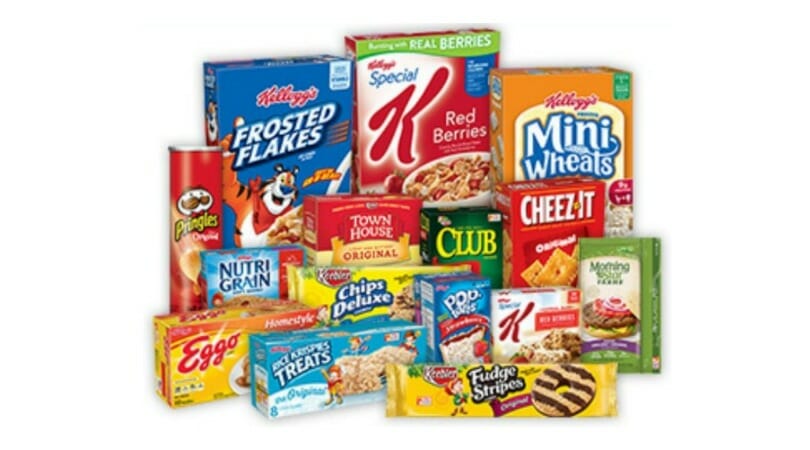The following report is from the Associated Press:
Kellogg’s, which also owns plant-based food brand MorningStar Farms, said Tuesday that the spinoff of the yet-to-be-named cereal and plant-based foods companies should be completed by the end of next year.
New Survey Reveals That A Growing Number Of Teens Are Embracing Plant-Based Meats
Kellogg’s had net sales of $14.2 billion in 2021, with $11.4 billion generated by its snack division, which makes Cheez-Its, Pringles and Pop-Tarts, among other brands. Cereal accounted for another $2.4 billion in sales last year while plant-based sales totaled around $340 million.
In a conference call with investors, CEO Steve Cahillane said separating the businesses will make them more nimble and better able to focus on their own products. All three businesses have significant stand-alone potential, he said.
Cereal will be solely dedicated to winning in cereal and will not have to compete for resources against the high-growth snacking business.
Said Cahillane, a former Coca-Cola and AB InBev executive who joined Kellogg in 2017.
Cahillane will become chairman and CEO of the global snacking company. The management team of the cereal company will be named later. The board of directors has approved the spinoffs.
Shareholders will receive shares in the two spinoffs on a pro-rata basis relative to their Kellogg holdings.
Cahillane said Kellogg has been carefully evaluating its portfolio since 2018, when it announced a plan to shift its resources toward its highest-growth categories, like snacks. In 2019, Kellogg sold its cookie, pie crust, ice cream cone and fruit business to the Ferraro Group.
The pandemic put further changes on hold, Cahillane said. But the company felt the time for the spinoff was right as the company has returned to growth. Kellogg’s net sales rose 3% in 2021.
Kellogg has been sharpening its focus on its fast-growing snacks for years; they now make up around 80% of the company’s sales. Pringles sales jumped 13% between 2019 and 2021, for example, while Cheez-It sales were up 9%.
But the prospects for cereal and plant-based meat are less clear.
U.S. cereal sales have been waning for years as consumers moved to more portable products, like energy bars. They saw a brief spike during pandemic lockdowns, when more people sat down for breakfast at home. But sales fell again in 2021. In the 52 weeks to May 38, U.S. cereal sales were flat, according to NielsenIQ.
Kellogg’s cereal business was also rocked last year by a fire at a plant in Memphis, Tennessee, and by a 10-week strike by more than 1,000 workers at plants in four states. The strike ended after the company promised higher wages, enhanced benefits and a quicker path to permanent employment for its temporary workers.

In March, a few hundred other workers at a plant that makes Cheez-Its won a new contract with 15% wage increases over three years.
Kellogg said it would explore other options for its plant-based business, including a possible sale. Cahillane said the plant-based category is seeing fierce competition from new – and, in many cases, unprofitable – entrants, and Kellogg needs to be more nimble and aggressive to counter that. To add to the pressure, U.S. plant-based meat sales have been plateauing in recent months after several years of strong growth. In the year ending May 28, U.S. plant-based meat sales were flat; in the same period in 2021, they were up nearly 20%, according to NielsenIQ.
The cereal and plant-based meat companies will remain headquartered in Battle Creek, Michigan, where Kellogg was founded in 1906. The snack company will be headquartered in Chicago with a campus in Battle Creek. Kellogg’s three international headquarters in Europe, Latin America, and AMEA will remain in their current locations.
Kellogg’s Partners With Gene-Editing Firm To Further Develop Faux Meats
Big-name companies have begun to split up at an accelerated pace, including General Electric, IBM and Johnson & Johnson, but such splits are more rare for food producers. The last major split in the sector was in in 2012, when Kraft split to create Mondelez.
Mondelez made its own big play in the snack business on Monday, when it announced it will acquire Clif Bar & Co., a major energy bar company. The $2.9 billion deal is expected to close in the third quarter.
This is a particularly perilous time in the food industry due to rising costs, both for labor and for material. Russia’s invasion of Ukraine has pushed grain prices higher and this month, the U.S. reported that inflation is hitting four-decade highs.
Shares of Kellogg rose almost 3% to $69.89 in morning trading Tuesday.
AUTHOR COMMENTARY
According to the Absolute Zero agenda goals for 2030 and 2050:
[By 2030] National consumption of beef and lamb drops by 50%, along with reduction in frozen ready meals and air-freighted food imports. [Afterwards] Beef and lamb [are] phased out, along with all imports not transported by train; fertilizer use greatly reduced.There are currently no freight ships operating without emissions, so shipping must contract [by 2030]. [By 2050] All shipping declines to zero.
As acknowledged by the AP, there was a large fire that hurt their operations; as dozens of other plants are being burned down and livestock continues to get butchered at alarming rates. As an outsider looking in, I *think* this split by Kellogg was in anticipation for the shifting and coming new food systems, and mandated dietary changes imposed on and accepted by the public; so, as their frozen foods and other convenient and comfort junk foods are quietly stripped from the stores, the company can better take the crunch and avoid heavy profit losses, whilst investing heavily in their plant-based slop that will be a homerun hit.
[1] Now the Spirit speaketh expressly, that in the latter times some shall depart from the faith, giving heed to seducing spirits, and doctrines of devils; [2] Speaking lies in hypocrisy; having their conscience seared with a hot iron; [3] Forbidding to marry, and commanding to abstain from meats, which God hath created to be received with thanksgiving of them which believe and know the truth.1 Timothy 4:1-3
[7] Who goeth a warfare any time at his own charges? who planteth a vineyard, and eateth not of the fruit thereof? or who feedeth a flock, and eateth not of the milk of the flock? [8] Say I these things as a man? or saith not the law the same also? [9] For it is written in the law of Moses, Thou shalt not muzzle the mouth of the ox that treadeth out the corn. Doth God take care for oxen? [10] Or saith he it altogether for our sakes? For our sakes, no doubt, this is written: that he that ploweth should plow in hope; and that he that thresheth in hope should be partaker of his hope. (1 Corinthians 9:7-10).
The WinePress needs your support! If God has laid it on your heart to want to contribute, please prayerfully consider donating to this ministry. If you cannot gift a monetary donation, then please donate your fervent prayers to keep this ministry going! Thank you and may God bless you.







